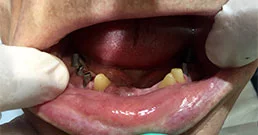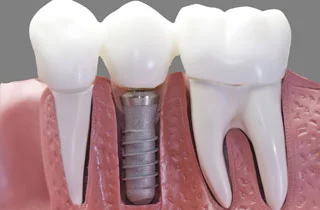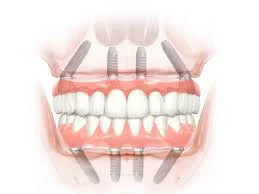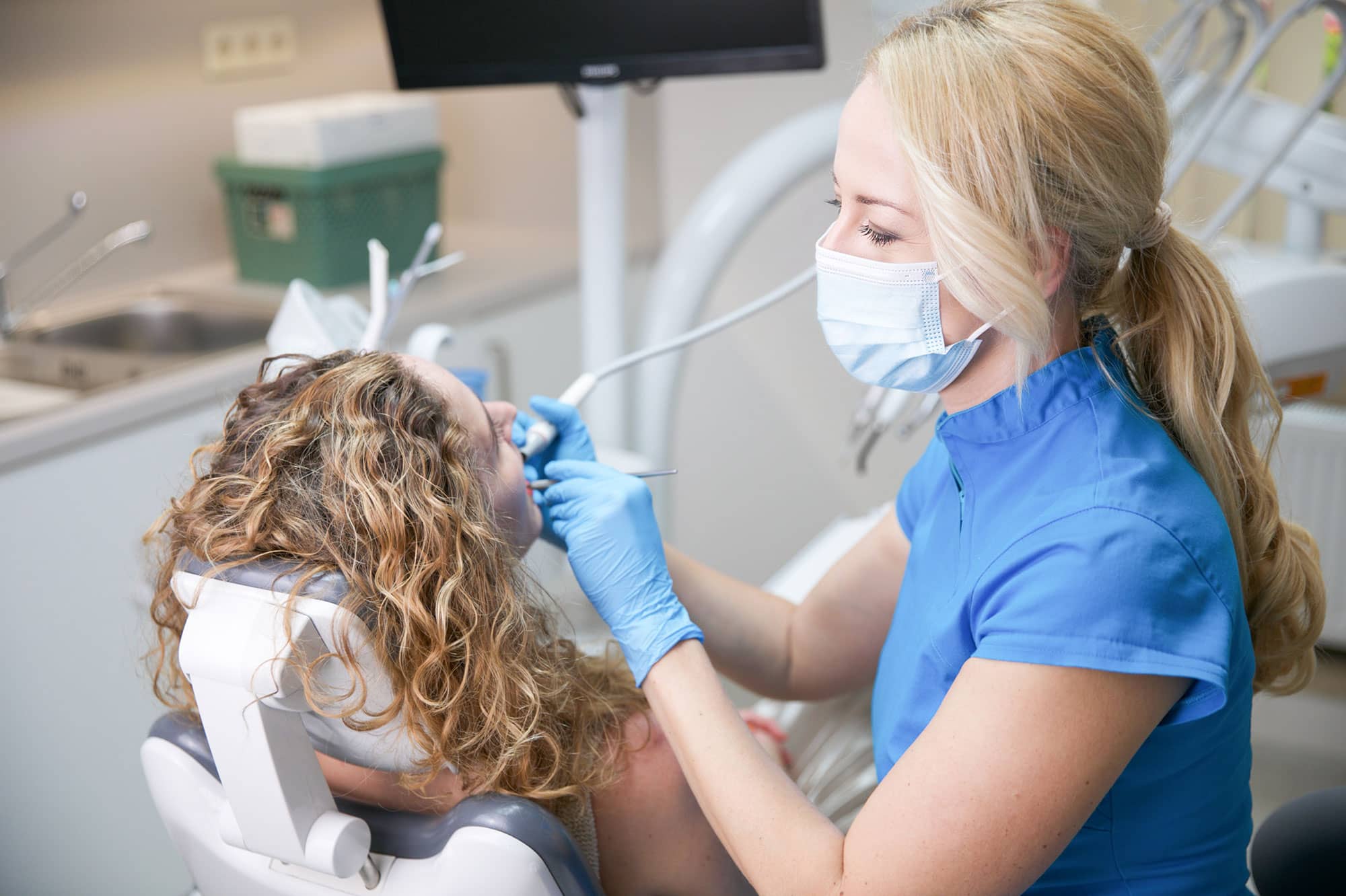A lost tooth is more than just a small gap in your smile – it can noticeably change your daily life. Suddenly you chew more carefully, speak differently, and perhaps you no longer feel as free to smile. And that’s completely understandable. Whether the tooth was lost due to an accident, decay, or gum disease, one thing is certain: it’s better not to ignore it. Because if left untreated, the situation can quickly worsen.
This article is aimed at people who have lost one or more teeth and want to learn about the causes, consequences, and modern options for tooth replacement – such as implants, bridges, or dentures – to regain their smile and well-being.

- What is the cause of tooth loss?
- What happens if a tooth is left unreplaced? Can you live long with missing teeth?
- How can a missing tooth be replaced?
What are the causes of tooth loss?
- Gum disease (periodontitis):
The leading cause of tooth loss in adults. Bacteria cause inflammation, which leads to gum recession and bone loss, causing teeth to loosen over time. - Tooth decay (cavities):
Untreated cavities can damage the structure of the tooth and reach the root, leading to infection and eventual tooth loss. - Poor oral hygiene:
Inadequate brushing and flossing leads to plaque buildup, which increases the risk of tooth decay and gum disease. - Trauma or injury:
Accidents, falls, sports injuries, or biting hard objects can cause a tooth to break or become dislodged. Severe fractures may make it impossible to save the tooth.

- Smoking and Tobacco Use:
Smoking weakens the immune system, making it harder to fight gum infections and heal after dental procedures. - Health Conditions:
Diabetes: Increases the risk of gum disease and delayed healing. Read more about dental implants in diabetes
Osteoporosis: Weakens bones, including the jawbone, making teeth more prone to falling out. - Genetics:
Some people inherit weaker enamel or are more prone to gum disease, which increases the risk of tooth loss. - Poor Diet:
A diet high in sugar and acidic foods promotes tooth decay. Lack of essential nutrients like calcium and vitamin D weakens teeth and bones. Read more about food for strong bones - Bruxism (teeth grinding):
Excessive grinding can wear down teeth and can lead to fractures or loosening over time. - Aging:
Natural wear and tear, as well as long-term exposure to bacteria, increase the likelihood of losing teeth over time.
The truth is: In about 80–90% of all cases, tooth loss can be prevented with proper care and regular check-ups. It’s not much effort, but a huge gain for your health.
What happens if a tooth is left unreplaced? Can you live long with missing teeth?
Yes, of course you can. But the question is: How pleasant is it?
A missing tooth not only looks unsightly, it also changes how you chew, speak, and even how your face looks. The jawbone deteriorates where there is no longer any load. Gradually, the adjacent teeth shift, chewing becomes more difficult, and even digestion can suffer.
In short: You can live with gaps. But it’s more beautiful, healthier, and above all more comfortable to close them. Today there are modern, gentle solutions that are barely noticeable and restore your smile very naturally.
- Intact teeth start to move in the direction of the missing tooth
- The teeth lose their original position, they extend, and roots lose stability
- The chewing strength of the teeth lessens
- Gums get inflamed
- Every bite causes pain, eating becomes a torment
- The jawbone does not get loaded, thus the bones become thin and decrease significantly
- The joints of the jaw also become inflamed
- The facial and neck muscles deform
- This deformation affects the spine and through it the whole body
- The posture, walk and position of internal organs change
How can a missing tooth be replaced?
Are you missing one or more teeth? Don’t panic, this happens more often than you think and there are really good ways to bring your smile back. And the best part: with the right solution, you also prevent other teeth from shifting or the jawbone from receding over time. Which option is right for you? That depends on a few things; your current dental condition, your wishes, and yes, also on your budget. But don’t worry, together we will find the solution that works best for you. And believe me: there is almost always an option that is both safe and looks natural.
Dental Implant (Best Long-Term Solution)

A titanium post is surgically placed into the jawbone and serves as an artificial tooth root with a crown on top.
Advantages: It looks and feels like a natural tooth, prevents bone loss, and preserves facial structure. With proper care, it can last a lifetime.
Disadvantages: Requires surgery and a recovery period (3–6 months) and is more expensive than other options. Where can you get affordable dental implants ? – Learn more about the Cost of Dental Implants
Dental bridge (fixed, non-surgical option)
A false tooth, also called a “pontic,” is essentially “hooked” between your existing teeth. For this, the adjacent teeth need to be slightly ground down – they serve as stable anchors for the Dental Crown.
Advantages:
Usually cheaper than an implant.
Quick treatment: Everything is done in 2–3 sessions.
No surgery needed – so gentler for you.
Disadvantages:
Healthy adjacent teeth must be ground down.
Bone loss is not prevented – your jaw still loses substance over the years.
And yes, after 10–15 years it may be necessary to replace the bridge.
In short: A dental bridge is often a quick and practical solution, but not always the most long-lasting. Together we will look at what works best in your case – after all, your smile should shine not only today but also tomorrow.
Partial dentures (removable and affordable)
The most cost-effective type of Dentures. A removable denture with artificial teeth, attached to a plastic or metal framework.
Advantages: Cost-effective option, no surgery required, and can replace several missing teeth.
Disadvantages: Less stable than implants or a Dental Bridge, and can be uncomfortable or shift when eating/speaking. Requires regular care and can wear out over time. Cost of Dentures
Flipper Tooth (temporary solution)
A lightweight, removable denture made of acrylic that serves as a temporary replacement. 
Advantages: Quick and cost-effective, a good short-term solution while waiting for an Implant or Bridge.
Disadvantages: Not very durable and can feel unnatural or uncomfortable.
All-on-4 or All-on-6 implants (full arch solution)
A full denture is supported by 4 or 6 implants in the jaw.
Advantages: Ideal for people missing multiple teeth or an entire jaw – more stable than a denture.
Disadvantages: Expensive, requires surgery, and extends recovery time. All On 4 Implant Costs
Losing a tooth – that’s not just unattractive for your smile, but it can also become really uncomfortable. Suddenly chewing becomes harder, speaking feels different, and the adjacent teeth tend to shift. Not to mention the Bone Loss that can develop without replacement. The good news: you don’t have to just accept this. Dental implants are just one way to reliably close your gap – and there are other modern solutions that are individually suited to you.
But let’s be honest: the best way is still to avoid getting into this situation in the first place. With the right Dental Care, many problems can be prevented beforehand. It might sound like routine – it is – but believe me: your teeth will thank you. So, a little attention every day, and your smile will remain radiant for a long time.


